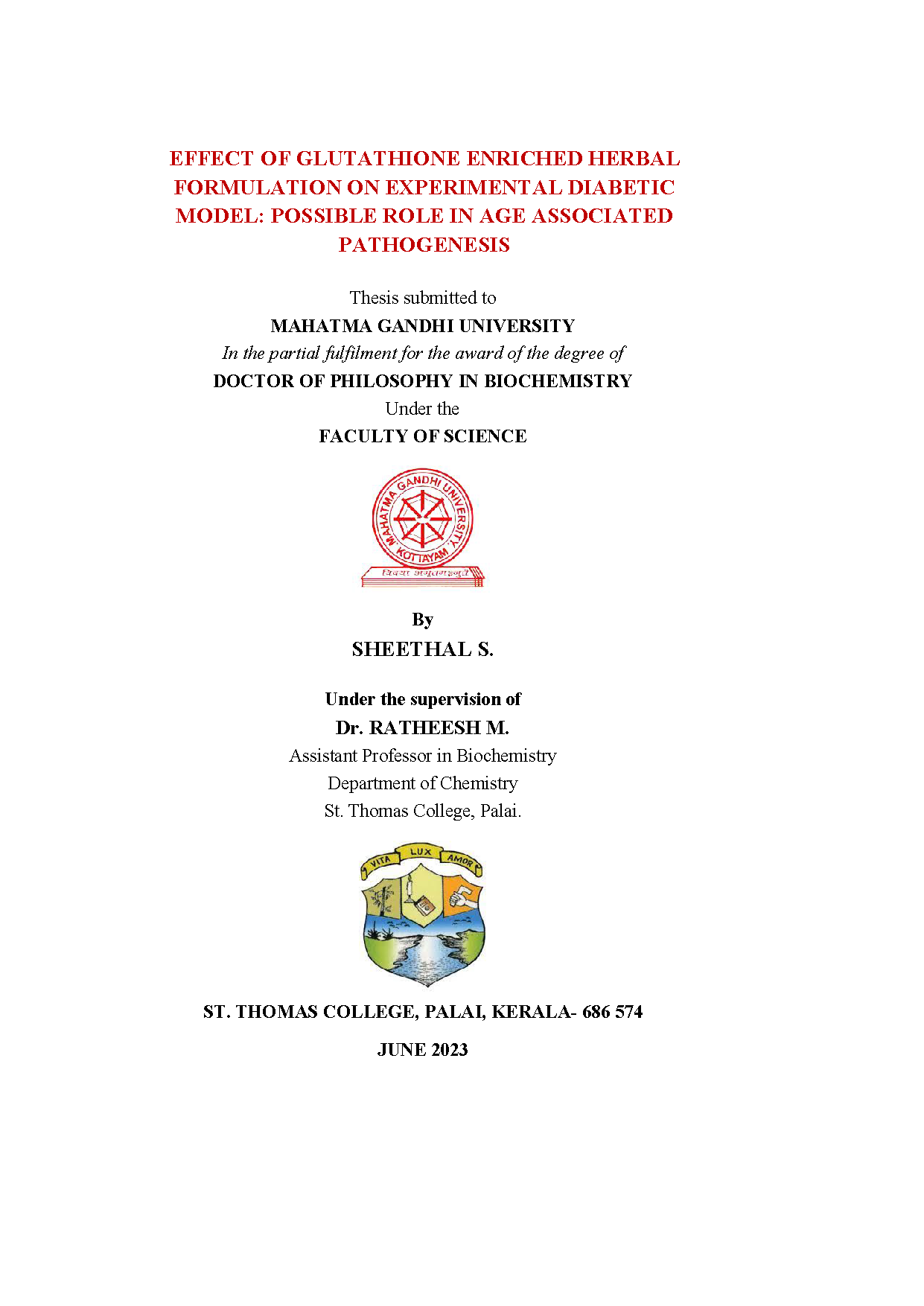
|
Effect of glutathione enriched herbal formulation on experimental diabetic model: possible role in age associated pathogenesis
| Accession Number |
T 4860 |
| Call Number |
|
| Research Scholar |
Sheethal S |
| Guide |
Ratheesh M |
| Year |
2023 |
| Centre of Research |
Department of Biochemstry, St Thomas College, Pala |
| Scholar Address |
Pankajamandiram, Kuttikkattukara P.O, Udyogamandal- 683 501 |
| Guide Address |
Assistant Professor, Department of Chemistry, St. Thomas College, Palai |
| Branch of Study |
Biochemistrty |
| Keywords |
glutathione enriched herbal formulation
experimental diabetic model
pathogenesis
Diabetes mellitus
History of diabetes mellitus
Types of diabetes mellitus
Type 1 diabetes
Type 2 diabetes
Gestational diabetes
Epidemiology of diabetes
Classical signs and symptoms of diabetes
Fasting plasma glucose
Oral glucose tolerance test
Glycated hemoglobin
Prevention and treatment of diabetes
Pharmacological therapy
Biguanides
Sulfonylurease
Alpha-glucosidase inhibitors
Thiazolidinediones
Glucose metabolism
Organs in glucose homeostasis
Glucose transporters
Facilitated glucose transporters
Sodium glucose cotransporters
Insulin biosynthesis
Insulin secretion
Insulin mechanism of action
Pathogenesis of type 2 diabetes
Glucotoxicity
Lipotoxicity
Free radicals
Types of free radicals
Biological activities of free radical
Formation of free radicals
NADPH Oxidase
Electron transport chain
Mitochondria
NO production
Oxidative stress
Oxidative stress in diabetes
Molecular and signalling pathways in diabetes
Glycolysis
Advanced glycation endproduct pathway
Interaction of AGE with its receptor
Protein Kinase C pathway
Chemical induction of diabetes in animal models
Antioxidants
Level of antioxidant action
Types of antioxidants
Water soluble antioxidants
Fat soluble antioxidants
Endogenous antioxidants
Exogenous antioxidants
Superoxide dismutase
Catalase
Glutathione peroxidase
Glutathione
Ascorbic acid
Tocopherol
Alternative therapies for diabetes
Antioxidant therapy
Herbalism
Curcuma longa
Capsicum frutescens
Murraya koenigii
Vitis vinifera
Antibodies
Preparation of glutathione enriched polyherbal formulations
Oral glucose tolerance test
Formulation of GEF tablet
Carr’s Compressibility Index
Hausner’s Ratio
Preparation of polyherbal tablets
Microbiological Load Analysis
Characterization of GEF tablets
UV-Visible spectroscopy
FT-IR analysis
LC-MS/MS analysis
Sample preparation
In-vivo induction of diabetes
Insulin resistance in L6 cell line
Analytical procedure
Assay of Catalase
Assay of superoxide dismutase
Assay of Glutathione peroxidase
Estimation of glutathione content
Estimation of nitrite level
α- amylase inhibitory activity
α- glucosidase inhibitory activity
Cell cytotoxicity assay
Intracellular ROS generation
Lipid Peroxidation
Glucose uptake assay
Estimation of HbA1c level
Enzyme linked immuno-sorbent assay
Western blot analysis
RT-PCR analysis
Total RNA isolation
cDNA synthesis
Thermo cycling procedure
Agarose gel electrophoresis
Statistical Analysis
Preparation and Optimization of Glutathione Enriched Herbal Formulation
Experimental design for OGTT
Toxicological assessment of Glutathione Enriched Polyherbal Formulation
Histopathology of internal organs
Characterisation and Formulation of Glutathione Enriched Polyherbal Formulation
Plant materials
Formulation Studies
Microbial load analysis in GEF
UV-Vis spectrum analysis
LC-MS chromatogram analysis
Anti-diabetic effect of glutathione enriched polyherbal formulation
Streptozotocin induced experimental model
Inhibiting AGE/NF-kB pathway
Estimation of Glycated haemoglobin
Enzyme-linked immunosorbent assay
Western blot analysis of Glo-I
mRNA expression of NF-κB and iNOS
Histopathological analysis of liver tissue
Histopathological analysis of pancreas tissue
Effect of glutathione enriched polyherbal formulation
Streptozotocin induced diabetic model
Regulating oxidative stress
PKC pathway
Liver enzyme markers
Antioxidant activity
TBARS level
Nitrite level
GLUT-2 gene expression in liver
Insulin sensitizing effect
High glucose-high insulin induced L6 skeletal muscle cells
Enzymatic Activity
Cell culture
Cytotoxicity analysis
Induction of insulin resistance in L6 cells
Glucose uptake assay
Protein expression of IRS-1
Akt
GLUT-4
Cell viability analysis
Validation of insulin resistance model
Morphological observation of L6 myoblast cells
Intracellular ROS level
TBARS level
|
|
|
